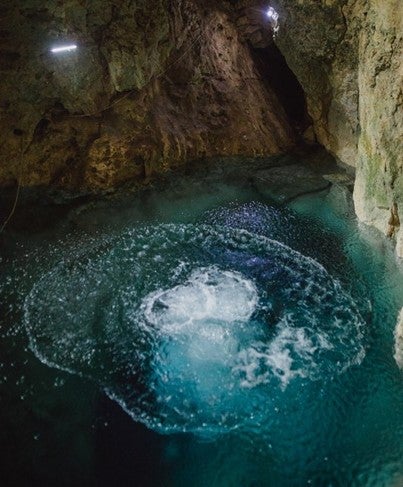Mexican Court Urged to Rule for Indigenous Mayan Youth in Constitutional Challenge to Massive Industrial Hog Operation on Yucatán Peninsula
Public health experts, conservationists present evidence to court of harm to human health, environment
Contact
Conservation groups, scientists, doctors and public-health experts filed a legal brief today supporting constitutional claims raised by Mayan children who oppose approval and operation of a massive industrial hog farm on ecologically sensitive and culturally important lands in the Yucatán Peninsula.
The friend-of-the-court (amicus curiae) brief filed in the Second District Court in the State of Yucatán today describes the substantial body of scientific evidence about the grave and irreversible harms to human health and the environment associated with industrial hog operations. These harms include contamination of water such as naturally occurring freshwater wells known as cenotes; emission of noxious air pollution; the spread of dangerous pathogens; and contributions to climate change.
Many of the experts joining the amicus brief are the authors of scientific literature cited in the brief.
“Numerous scientific studies provide evidence that industrial hog operations release contaminants into neighboring communities, where they affect the health and quality of life of neighbors. Such operations have been associated with increases in wheeze and asthma symptoms, blood pressure and stress and anxiety among residents living nearby,” said Dr. Jill Johnston, an assistant professor of population and public health sciences at the University of Southern California’s Keck School of Medicine who joined the amicus brief.
Today’s brief supports a lawsuit challenging a decision by Mexican authorities to permit a 49,000-hog industrial animal operation in an ecologically sensitive area near the Mayan town of Homún. The lawsuit describes how the decision to allow the massive facility, despite risks to air and water quality and human health, violates the Mayan children’s rights to a healthy environment and to autonomy as an Indigenous people.
Last year the First Chamber of the Supreme Court of Justice of Mexico upheld a suspension of the mega hog farm until the merits of the present challenge could be decided by the lower court. Many of those joining today’s brief also submitted a brief to the Supreme Court in support of that suspension.
“We’re proud to support the Mayan children’s battle to preserve their ecological and cultural heritage against the existential threat this destructive mega factory farm poses,” said Hannah Connor, a senior attorney at the Center for Biological Diversity. “We hope the court will enforce the environmental principles enshrined in the Mexican constitution to protect the rights of Indigenous Maya to a healthy environment.”
Industrial animal operations are notorious polluters. The operation at issue in this lawsuit is expected to generate more than 600 million pounds of urine and feces each year — more waste than is generated by the entire human population of Tijuana. That waste is expected to be disposed of onsite, posing an ongoing threat to people nearby and the surrounding environment.
“The scientific studies described in today’s brief document over 40 years of evidence that industrial hog operations poison workers, communities and the environment. Authorities shouldn’t wait until children get sick to address these harms,” said Guillermo Zúñiga Martínez, an attorney with Earthjustice. “Instead, Mexican and international law require authorities to take all necessary steps to ensure that these unacceptable harms do not occur.”
In fact, as documented in the Greenpeace report The Meat That Is Consuming the Planet, the unchecked growth of industrial hog operations has already degraded the air, soil, and water of the Yucatán Peninsula. The challenged facility threatens to exacerbate these harms.
“The industrial livestock model is highly polluting and negatively impacts the environment and people, in particular, the Mayan communities,” said Viridiana Lázaro, food and agriculture campaigner for Greenpeace Mexico. “This type of intensive production is close to population centers and cities, resulting in increased exposure to disease. That is why we must seek a transition from the agroindustrial model toward agroecological, sustainable, and healthy production that respects the cycles of nature and guarantees respect for the rights of people.”
The Yucatán Peninsula is host to four sites protected by the Ramsar Convention, an intergovernmental treaty that protects spectacular wetlands: Laguna de Terminos, Ring of Cenotes Geohydrological Reserve, Laguna de Yalahau State Park, and Ría Celestún Biosphere Reserve.
The Ring of Cenotes Geohydrological Reserve, located in Homún, is a unique and culturally important wetland that is especially vulnerable to pollution from the challenged operation. The cenotes in the reserve are home to endangered and threatened species, including three fish: the Mexican blind brotula, blind swamp eel and Yucatán molly.
The cenotes also provide resting areas for waterfowl during their migration south and vital habitat for native species such as the Yucatán box turtle, Yucatán mushroom-tongued salamander, Ridgway’s rough-winged swallow and Yucatán jay.
“Extensive scientific research has documented that industrial-scale pig confinement operations using waste pits and land disposal can contaminate groundwater, pollute surface waters, and emit hazardous gases into the air,” said Kelly Hunter Foster, an attorney with Waterkeeper Alliance. “It is well established that these outdated practices pose substantial threats to people and natural resources.”
Earthjustice filed today’s brief on behalf of itself, the Center for Biological Diversity, Coastal Carolina Riverwatch, Greenpeace Mexico, La Paz Waterkeeper, Waterkeeper Alliance and experts Larry Baldwin, Dr. Lawrence Cahoon, Dr. Meghan Davis, Dr. Mike Fliss, Dr. Jill Johnston, Dr. Robert S. Lawrence, Robert P. Martin, Dr. Arbor J.L. Quist, Dr. Ana María Rule, Dr. Kendall Thu, Dr. D’Ann Williams and Dr. Sacoby Wilson.

Additional Resources
About Earthjustice
Earthjustice is the premier nonprofit environmental law organization. We wield the power of law and the strength of partnership to protect people's health, to preserve magnificent places and wildlife, to advance clean energy, and to combat climate change. We are here because the earth needs a good lawyer.